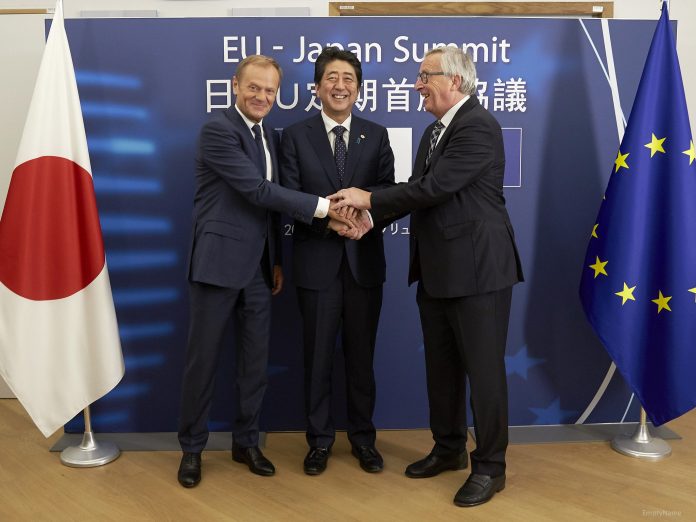The European Parliament gave its consent to the EU’s trade agreement with Japan, the largest bilateral trade deal ever negotiated by the EU.
The Economic Partnership Agreement between the EU and Japan, approved with 474 votes to 152 with 40 abstentions on Wednesday, will remove almost all custom duties adding up to €1 billion annually for EU companies. It represents a clear stance in support of rules-based, free and fair trade “at a time of serious protectionist challenges”.
Agriculture, SMEs win
While the most sensitive EU sectors such as rice production are safeguarded, wine, cheese, beef, pork, pasta, chocolate and biscuits will enter duty-free either immediately or after a transition period, 205 products with European geographical indications will be protected, to help small and medium sized enterprises (SMEs) which make up 78 percent of exporters to Japan. Parliament urges the Commission to set up contact points for them, so that they can quickly benefit from the agreement.
Railways, services
Japan opens up its rail procurement market and public procurement in its main cities to European competition. E-commerce, international maritime transport and postal services will also be liberalised.
Labour codes
The Parliament welcomed the high level of environmental and labour protection, the commitment to the Paris Agreement to combat climate change, and encourages both parties to combat illegal logging. MEPs nevertheless stressed that Japan must ratify all relevant labour codes set by the International Labour Organisation.
Parliament also approved today the Strategic Partnership Agreement with 535 votes for, 84 against and 45 abstentions, which extends cooperation to areas such as energy, education, research and development, development, and the fight against climate change and terrorism.
“With the US president attacking multilateral cooperation and threatening to start trade wars, the approval of this agreement could not have come at a more important time. It shows that the EU remains committed to a fair and rules-based international order, where we play an important role in setting high standards in international trade. This is a good agreement for citizens, workers, farmers and small and medium-sized enterprises. European products and services will gain important new opportunities in the Japanese market,” said Pedro Silva Pereira (S&D, PT), the rapporteur in charge of the trade agreement.
“This is the most progressive trade agreement the EU has ever signed with any country. It commits both parties to meeting high levels of environmental and labour protection. It fully respects public services and the right to regulate. We have secured a commitment from the Japanese to pursue the ratification of the International Labour Organisation core conventions, as well as a review clause to improve the enforceability of labour and environmental provisions. The agreement also ensures the implementation of the Paris agreement on climate change. We now ask both parties to deliver on their commitments and truly unlock the progressive potential of this agreement,” he added.
“The agreement with Japan connects two of the world’s most advanced economies, with a taste for each other’s goods and services, with some of the highest product and consumer protection standards, and with common values“, said Christophe Hansen MEP who is the EPP Group Shadow Rapporteur.
The EU-Japan deal covers almost 40 percent of world trade and one third of the global gross national product (GNP). 97 percent of tariffs currently applicable will be abandoned. For the first time in an EU trade agreement, the goals of the Paris Agreement on fighting climate change and other environmental standards are included. “In a world where Twitter declarations initiate trade wars and where walls and protectionism have gained wide currency, the agreement with Japan is a blueprint for future agreements, an economic boost and a geopolitical imperative”, said Hansen.
“Today the EU and Japan have sent a message to the world in defence of multilateralism and international cooperation. We have created a free trade bloc that will account for almost a third of world output. In turbulent times for international trade, this agreement will help both of our economies weather the storm. We have fought hard to ensure an agreement that benefits European workers and avoids the most controversial aspects of previous trade deals,” added S&D Group spokesperson for international trade Alessia Mosca.
“The European Parliament’s answers to the challenges of globalisation are cooperation and global standard setting. We firmly reject inward-looking protectionism and nationalist tendencies – they will not solve the pressing problems we are facing, but only drive us further apart. It will be crucial to swiftly implement the accord and involve civil society at every step to ensure that the agreement benefit workers and citizens,” said Bernd Lange (S&D, DE), the chair of the trade committee.
Japan has already ratified the agreement. After the endorsement of the trade deal by the European Parliament, Council is set to give its final go-ahead on 21 December which allows the agreement to enter into force on 1 February 2019. For the strategic partnership agreement to enter into force, all member states have to ratify it.
The EU-Japan Economic Partnership Agreement, signed on 17 July 2018, creates a trade zone of 600 million people, and covers a third of global GDP and about 40 percent of global trade.
Negotiations on a separate investment protection agreement with Japan are ongoing.

